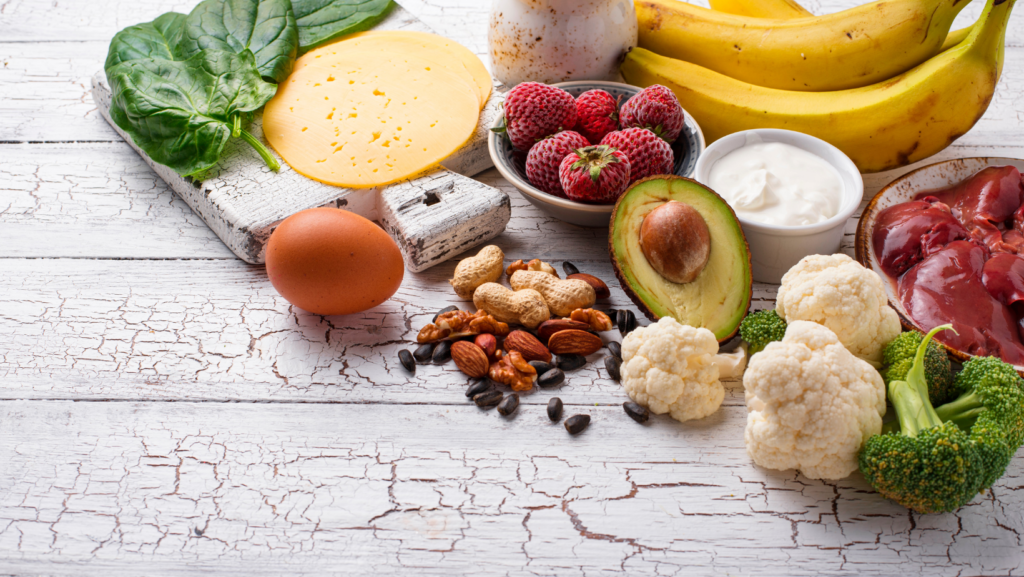The B vitamin family includes 8 water soluble vitamins that play a significant in human health and metabolism and together they make up the vitamin B complex. B vitamins have a crucial role in:
- Cellular health
- DNA expression
- Neurotransmitter synthesis
- Formation of energy from carbohydrates, fats and protein
- Healthy brain and nervous system function
- Red blood cell formation
- Cardiovascular health
Thiamin (Vitamin B1)
The daily value for thiamin is 1.2 mg daily. Good food sources of thiamin include whole grains and fortified foods, pork, legumes, nuts and seeds. Deficiency of B1 is uncommon, but can be seen in those with alcohol dependence, HIV, diabetes, heart failure or who have undergone bariatric surgery. Thiamin is needed for metabolism and the breakdown of carbohydrates. It is also needed to synthesize neurotransmitters and produce fatty acids.
Riboflavin (Vitamin B2)
The daily value for riboflavin is 1.3 mg daily. Good food sources of riboflavin include organ meats, oatmeal, dairy foods, mushrooms and almonds. Signs of deficiency include skin issues, mouth sores, a swollen mouth and lips, and hair loss. Vegans may be a risk for deficiency since they don’t consume dairy or meats. Riboflavin is needed for energy production, breaking down drugs, steroid hormones and fats, converting the amino acid tryptophan into niacin and converting Vitamin B6 into a coenzyme to be used in energy production.
Niacin (Vitamin B3)
The daily value for niacin is 16 mg daily. Niacin is used in the body as a coenzyme (think of a coenzyme as a helper catalyst for all the processes of the body) after it has been converted to NAD. NAD is a part of over 400 different enzymatic reactions. It is especially important for the conversion of the food we eat into energy and normal DNA expression. Niacin is found in the highest concentrations in meat, poultry and seafood. Plant foods like nuts, beans and grains contain some niacin, but it not as easily used by the body. Niacin deficiency is called pellagra and may manifest as skin discoloration, patchy skin, a bright red tongue, GI upset, fatigue or depression. Populations who are most at risk for niacin deficiency may include those who are malnourished, have an alcohol dependency or who have malabsorptive diseases like inflammatory bowel disease or celiac disease.
Pantothenic Acid (Vitamin B5)
The daily value for pantothenic acid is 5 mg daily. Almost all foods contain Vitamin B5 but the best sources include animal proteins, avocadoes, mushrooms and sunflower seeds. Pantothenic acid is used to make new coenzymes from fats and protein. Because Vitamin B5 is found in so many foods, deficiency is very rare but may be seen in those with genetic mutations.
Pyridoxine (Vitamin B6)
The daily value for pyridoxine is 1.7 mg daily. Vitamin B6 is Involved in energy metabolism of proteins, carbohydrates and fats and is also involved in 100 different enzymatic reactions. It plays a role in the creation of neurotransmitters like serotonin, dopamine and GABA. Vitamin B6 reduces levels of homocysteine. High homocysteine levels are linked to increased risk of heart disease, stroke, depression and Alzheimer’s Disease. Finally, Vitamin B6 is needed for proper formation of red blood cells and hemoglobin. Hemoglobin is the protein responsible for transporting oxygen through the body. The best food sources of Vitamin B6 are fish (tuna and salmon), liver and other organ meats, beef, chicken, chickpeas, potatoes and other starchy vegetables, and fruits like bananas. Signs of deficiency include anemia, a swollen tongue or cracking at the corners of the mouth, depression and confusion. Those most at risk for deficiency include those with kidney disease, celiac disease
Biotin (Vitamin B7)
The daily value for biotin is 30 mcg daily. Biotin is used by the body to break down carbohydrates, fats and protein for energy. It is also necessary for proper cellular communication and the expression of DNA. Biotin is found in many foods including animal meats, eggs and sunflower seeds. Deficiency may manifest with hair loss/thinning hair, skin rashes, weak/brittle nails, fatigue or depression.
Folate (Vitamin B9)
The daily value for folate is 400 mcg. The form found is food is called folate, while folic acid is found in many supplements and fortified foods. Folate is an especially important nutrient in pregnancy because it helps to prevent birth defects involving the brain and spinal cord. It is needed for proper DNA replication and cell division. Many people may be inefficient at converting folate from food and folic acid from supplements into the form that the body uses. Generally, we recommend the L-methyl folate form in supplements for this reason. Folate is found naturally in green leafy vegetables, organ meats, avocado, eggs, beans and nuts. Populations at risk for deficiency include pregnant women, those with alcohol dependency or those with malabsorptive disease like celiac disease or IBD. Folate and B12 have a synergistic relationship and folate supplements may mask symptoms of B12 deficiency. Because of this, it’s often advised to take folate and B12 in supplement form together.
Cobalamin (Vitamin B12)
The daily value for cobalamin is 2.4 mcg. The best dietary sources of B12 include Animal meats like beef, pork, poultry, fish, dairy products (cheese, milk and yogurt),mushrooms, eggs and nutritional yeast (a great vegetarian/vegan source of Vitamin B12 which has an umami flavor and is dairy free). Vitamin B12 serves many important functions in the body and is involved as a coenzyme in metabolic pathways that produce energy, brain and nervous system health, regulating DNA and formation of our red blood cells as well as methylation pathways. B12 serves as a cofactor (or helper) for the production of the amino acid methionine and SAMe, which is our universal methyl donor.
Sources:
https://medlineplus.gov/bvitamins.html
https://ods.od.nih.gov/search.aspx?zoom_query=B-Complex



